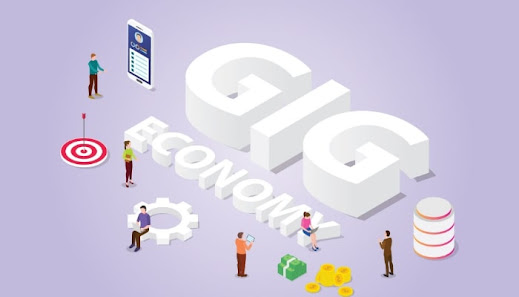 |
"The Rise of the Gig Economy: How Freelancing is Changing the Way We Work" |
The gig economy, also known as the freelance economy, is on the rise and changing the way we work. It refers to the trend of more and more people engaging in short-term, flexible work arrangements, such as freelancing or working on a project-by-project basis, rather than holding traditional, long-term jobs.
There are a few reasons why the gig economy is growing. One is the increased availability of technology, which makes it easier for people to find and connect with freelance opportunities. The internet and social media platforms have made it simple for businesses to find and hire freelancers, and for freelancers to find work. Additionally, the rise of the gig economy is driven by the increasing number of people who are seeking flexibility in their work lives. Many people are looking for ways to balance their personal and professional lives, and freelancing allows them to do that by giving them control over their schedule and work environment. The gig economy is not just affecting individuals, it is also having a big impact on businesses. Companies are increasingly turning to freelancers to fill short-term needs, rather than hiring full-time employees. This allows them to be more agile and responsive to changing market conditions, and it also allows them to save money on benefits, training, and other costs associated with full-time employees. While the gig economy is growing, it is not without its challenges. One of the biggest challenges is the lack of job security. Freelancers often have to constantly look for new work, which can be stressful and uncertain. Additionally, freelancers may not have access to benefits like health insurance or retirement plans that are typically provided by employers. Another challenge is the lack of legal protections for freelancers. Many freelancers are not aware of their rights, and they may not have the same protections as employees. This can lead to issues such as non-payment or disputes over the scope of work. Despite these challenges, the gig economy is likely to continue to grow in the future. The trend towards more flexible and decentralized work arrangements is a reflection of the changing nature of work and the economy. As technology continues to advance and more people seek greater control over their work lives, the gig economy will become an increasingly important part of the way we work. The gig economy is also changing the way we think about work and career. In the past, people often stayed in the same job for many years and worked their way up the corporate ladder. Today, many people are looking for more diverse and dynamic career paths, and the gig economy offers them the opportunity to explore different roles and industries. In conclusion, the rise of the gig economy is changing the way we work. It offers many benefits, such as greater flexibility and control over one's work life, and it allows businesses to be more agile and responsive to changing market conditions. However, it also poses some challenges, such as lack of job security and legal protections for freelancers. Despite these challenges, the gig economy is likely to continue to grow in the future as more and more people seek more flexible and dynamic career paths. |


No comments:
Post a Comment